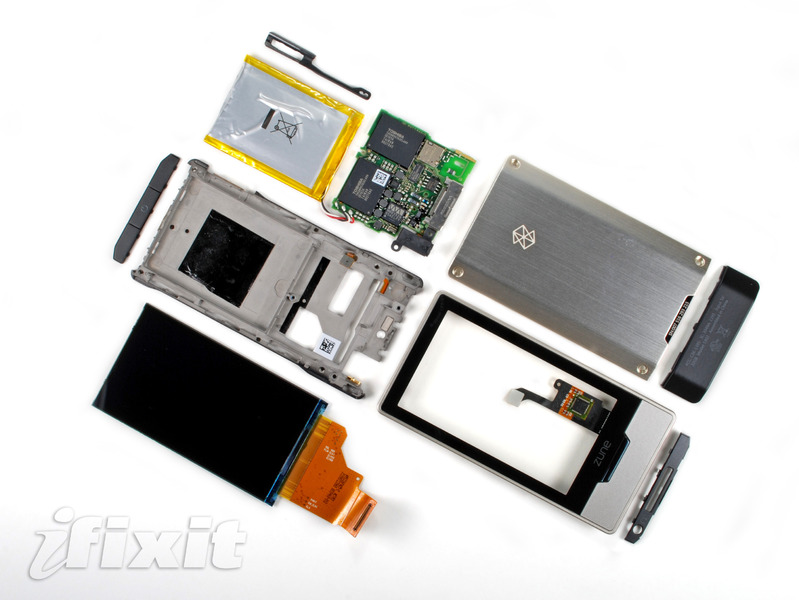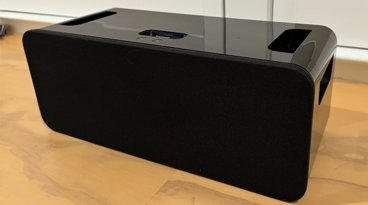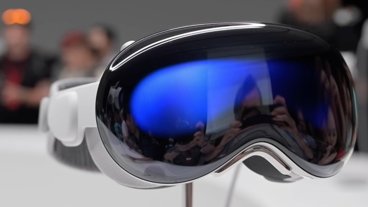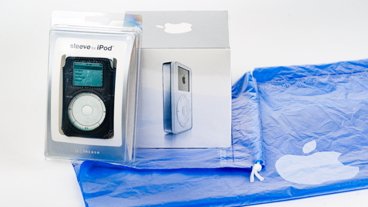Apple, Microsoft trade places selling iPod touch and Zune HD
In order to captivate users' attention in the exploding category of mobile entertainment devices, the two companies have stepped outside their usual core competencies. In the process, both companies have made mistakes in areas where they should be expected to shine.
iPod kills the video star
Despite Apple's hardware savvy in consumer devices, based in part on eight years of wildly successful iPod sales, the company reportedly fumbled the delivery of planned video camera features in the latest generation of the iPod touch. Rather than expanding the video capture features of the iPhone 3GS across all iPod models, Apple restricted it to the new iPod nano, leaving the latest iPod touch with nothing more than a blank spot where the camera mechanism was reportedly supposed to be installed.
Sources say the decision was made late in the game in response to bad parts that didn't work as expected. Steve Jobs, ever the showman, explained to the New York Times that Apple wanted to bring the price of the iPod touch down as rapidly as possible, and saw more benefit to pitching the iPod touch as a gaming device than as a video camera. That distinction was left to the iPod nano.
"What customers told us was, they started to see it as a game machine," Jobs said. "We started to market it that way, and it just took off. And now what we really see is it’s the lowest-cost way to the App Store, and that’s the big draw. So what we were focused on is just reducing the price to $199. We don’t need to add new stuff. We need to get the price down where everyone can afford it."
According to sources familiar with Apple's plans, new devices in the Apple pipeline are regularly given experimental features that can be pulled last minute if they don't work out as planned, or contribute too much to the devices' cost or introduce other problems. In any event, the lack of a rumored feature on the iPod touch could put Apple in the position Microsoft found itself in while launching Vista: forced to defend expected features that didn't make the cut rather than being able to focus on the details it wanted to promote.
That in turn could give the Zune HD more of an opportunity than it might have had if Apple had launched the iPod touch with video recording features. The other ironic twist is that Apple's lapse in hardware savvy, whether due to bad parts or simply done for cost savings, is being made up for in a "developers, developers, developers" pitch that promotes the range and depth of mobile software available for the iPod touch, particularly game titles. That's a page right out of Microsoft's playbook.
Banking on hardware
At the same time, Microsoft has similarly shifted attention away from its own core competency in developing software platforms and nurturing third party software to promote the Zune HD as a series of hardware features: primarily its OLED screen, NVIDIA Tegra processor, and its HD Radio support. That sounds a lot like the old Apple.
Promoting OLED is an expensive option for Microsoft, and one which carries some early adopter risk. A parts teardown by iFixit says the Samsung-built 3.3" display "is likely the most expensive item on the Zune's bill of materials" and "incredibly thin (1mm)." The part is credited with contributing to the Zune HD's battery life, which is rated longer than the iPod touch despite having a battery capacity of 660 mAh. "That's about 16% less than the 789 mAh battery in the new iPod touch," the teardown notes.
Back during the early days of Mac OS X, Apple focused primarily on the Mac's hardware advantages, such as the iMac's creative LCD panels and its PowerPC processor that Apple advertised as smoking Intel's Pentium 4 offerings, which at the time were running hot rather than fast. Apple didn't have as much to talk about on the Mac software front, as developers continued to look at the company's roadmap with skepticism. During the first several years of iPod development, Apple similarly focused primarily on hardware features, with only limited dabbling in closed, selective efforts to produce iPod Games.
That all changed with the 2008 iPhone App Store, which opened for business with hundreds of developers lined up to build titles for the five million and growing installed base of iPhone users. Along with its efforts to develop a mobile WebKit browser, Apple has captivated the mobile software industry's attention, and now sits on an installed base of 50 million iPhone and iPod touch users.
No app store yet for Zune HD
This has resulted in Microsoft being cornered by expectations that it will immediately match the development tools, software merchandising, scale, and scope of Apple's runaway App Store success, both with the Zune and with Windows Mobile. While both families of devices are built upon the same core operating system, Microsoft doesn't have a unified strategy for software that works across both. In contrast, Apple's App Store titles are designed to work across the iPhone and iPod touch without a hitch.
An interview with Brian Seitz, the Zune's marketing manager, reveals that Microsoft's Zune team has been developing most of its own software and that no real market yet exists for third party titles.
"When it comes to apps on Zune on the 15th," Seitz told the Seattle Times, "what you'll see is primarily games. We're refreshing a lot of the games to take advantage of the multitouch. Casual games, plus a couple of apps like the weather app and calculator. Plus we're building a Twitter (app), a Facebook (app) and a bunch of 3D games like 'Project Gotham Racing' that will come out in November.
"All of our apps are free ... and it's a managed solution right now, so we're building these apps or working with third parties to build these apps and provide them to our customers for free."
Developers, Developer Developers?
Asked about third party development, Seitz said, "It's hard to say right now. If you look around the company at other places where things like this are important, Windows Mobile rises to the top. They have devices which are always connected, which make applications like maps really cool and important.
"On a sometimes-connected device, what people are using them for are games. So what we didn't want to do was build two parallel app store experiences that didn't work together.
"Right now our product roadmaps didn't line up perfectly for us to snap to what they're doing or vice versa. That being said, we know people want things like this on their devices so we're going to build them ourselves, they're going to be super high-quality, and they're going to be free. Down the road if there's a way we can work with Windows Mobile or another group inside the company that's building an app store and take advantage of that, that's something we'll look into."
Mobile apps are a 'distraction'
Asked about the features Apple was adding to its iPods, including video recording, Seitz replied, "The more things like that that make their way into these devices that aren't about great music and video playback, the more it's distracting or sacrificing that original purpose of the device. Apps are jamming in, cameras — that's work that's not being done on the music front."
While Apple once talked about the iPod being all about music, today it is augmenting music with other features, although music remains at the core of the iPod touch and iTunes. These days, new music-related features like Genius Mixes and Voice Control are getting equal billing with web browsing and game play, and Apple's ads for the touch are almost entirely about the range of video games available.
Everyone already knows that the iPod is a music player, so Apple is expanding into other software markets, taking new shots at handheld gaming devices from Sony and Nintendo. At the same time, Apple has delivered features that enable third party game developers to let iPod users play and control their own song playback within their games.
As the Zune HD attempts to reverse the course of the Zune brand in its third season on the market, Microsoft is finding itself in the role of the underdog platform, resorting to the same strategies Apple used to promote the Mac under the umbrella of ubiquitous Windows PCs. It remains to be seen how Microsoft's 'get a Zune' campaigns and efforts to build out direct retail stores will work out, but at least the company has an almost flawless model to follow in trying to beat back Apple's increasing domination of the mobile device world.
 Prince McLean
Prince McLean











 William Gallagher and Mike Wuerthele
William Gallagher and Mike Wuerthele
 Christine McKee
Christine McKee
 William Gallagher
William Gallagher
 Malcolm Owen
Malcolm Owen
 Marko Zivkovic
Marko Zivkovic


 Wesley Hilliard
Wesley Hilliard







